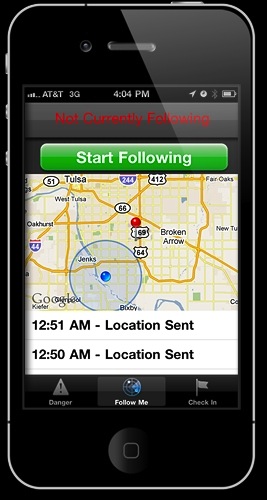Northeastern State Adds GPS-Savvy Security Mobile App
- By Dian Schaffhauser
- 01/06/12

Personal Guardian allows students to ask campus security to track the location of their phone when they're in dangerous or uncomfortable situations. |
Northeastern State University in Oklahoma will introduce a customized version of a mobile security app this month that allows students to notify campus police about their whereabouts. Personal Guardian, from MacroSolve, a Tulsa-based company, lets the student notify campus dispatch to track the location of their phone. The app runs on both Apple iPhone and Google Android devices. Northeastern State has about 13,000 students at three campuses.
"The campus police are really excited about this app," said Patti Buhl, director of public safety and chief of campus police. "It provides enhanced safety whether one might be in danger or wants to let campus dispatch know their location. I like to describe it as a mobile blue light phone."
The program has three modes: danger, follow me, and check-in:
- The danger mode requests an emergency response. It calls the campus police, sends the phone's GPS coordinates, and tracks the device until deactivated by a pass code;
- The follow-me mode is for use when the student is in an uncomfortable environment; when activated, it notifies campus dispatch and tracks the phone using GPS for a period. The user may also request an officer for escort; and
- The check-in mode allows a user to notify campus dispatch of a chosen destination and anticipated travel time. Arrival at a destination is confirmed by GPS. If an arrival is overdue, the user's designated contacts are notified.
Activation notifies the main campus dispatch; however, branch campus police will receive alerts of requests from their respective remote campuses.
"Some people don't want to bother us or they believe we are just too busy to provide safety escorts, but that is absolutely not true," said Buhl. "The great thing about the follow me feature is it removes any apprehension people might feel about contacting us."
"We anticipate this will be very useful to those who are having car trouble or must travel during poor weather," Buhl said.
About the Author
Dian Schaffhauser is a former senior contributing editor for 1105 Media's education publications THE Journal, Campus Technology and Spaces4Learning.